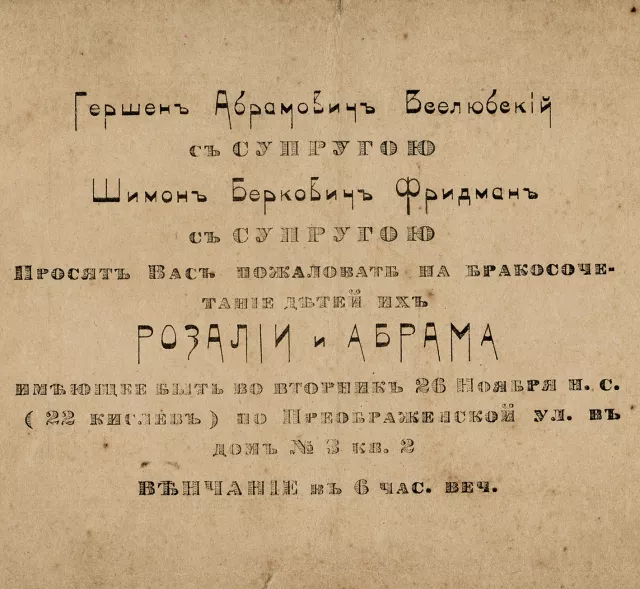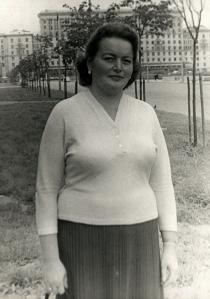Wedding invitation of Rita Kazhdan's parents, Rozalia and Abram Fridman
This is the wedding invitation to my parents?, Rozalia Vselubskaya and Abram Fridman's wedding in 1918. The wedding was held in Minsk.
My father was born in 1896 in Minsk into the rich family of his father, the manufacturer and dye-house owner. I don't know if father had even studied anywhere, but he worked as an engineer and director of studios at the State Film Company of Belarus. He was a kind, fascinating person, a man of fashion; the center of all social gatherings in our house. When all grandpa Fridman's property was nationalized and he escaped from Minsk to Petrograd with a part of the family, my father remained in Minsk. He got married to mum in 1918. The wedding was in Petrograd. Both families were present at the wedding.
My mother was also born in Minsk in 1898. Her childhood and young years were spent in luxury and insouciance. Her family was a very well-to-do family. Before the Revolution of 1917 she finished a Russian secondary school. One can say that my grandparents were rich, because secondary education was rather expensive. When my mum got married, they had no children for 10 years and she was engaged in self-education. Mum knew English, French, German, Yiddish, Hebrew, and Polish. For example, when she studied English, for some period she spent all her time with an English governess who walked with her even to the lavatory's door. They used only English both in writing and talking. When she began to study German, she had already had some basic knowledge of it, because Belarus was occupied by Germans in 1914-1917, during World War I, plus she had a private tutor. With the French language it was the same story. There was a hired teacher because they could afford having one.
My parents loved each other very much, and the fact that they had no children for a long time didn't affect their relationship. They were very progressive people. Mother was always in the first ranks. At that time such organizations as GTO [Ready for Work and Defense], PVHO [Anti-Air-Raid Chemical Defense], Osoaviachim [Society of Assistance to Aviation and Chemical Defense] were fashionable. She participated in all these arrangements, right up to flying in an airplane - she took an airplane when there were excursions over the city. She, as a progressive woman, was always rewarded with first prizes.
Up to the mid-1930s, mum didn't work. She was a woman of the high life. In 1936, when I began to go to school, and my brother Grigory grew up a bit, mum became proficient in accountancy and went to work in the State Railway Administration. Though we were well-to-do people, it was impossible not to work in those years, as it was condemned by the public morality.
We lived in a good two-room deluxe flat, which was bought for my parents by grandpa Grigory Vselubsky after their marriage. The flat was heated with firewood. After the reduction of living space per person by the Soviet authorities, before my birth, a Latvian lady was accommodated in my parents' flat. She was a government official and was given one of our rooms. Before this reform, our flat was considered a luxury one because everyone around lived in communal apartments. We had a dining room of 30 square meters and our bedroom was 18 square meters plus a small corridor and a kitchen. We had meals only in the dining room.
Amongst the furniture we had a walnut couch - a small sofa made of walnut padded with green velvet. We had an oak sideboard, dark, with good-looking encrustation, and on it there was a pink tea set, a 'Kuznetzovsky'. [Kuznetzov was a famous pre-revolutionary owner of porcelain works.] It was of magnificent beauty, a superfine one.
During the war were were in the Minsk ghetto any my parents were killed there by the Germans: my father in 1941 and my mother in 1942.










